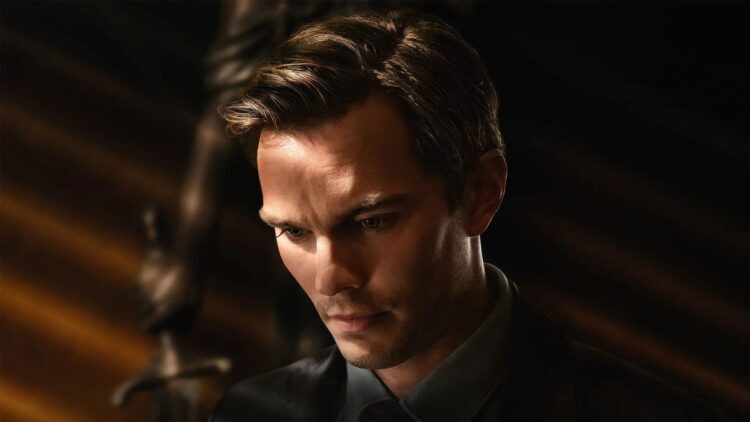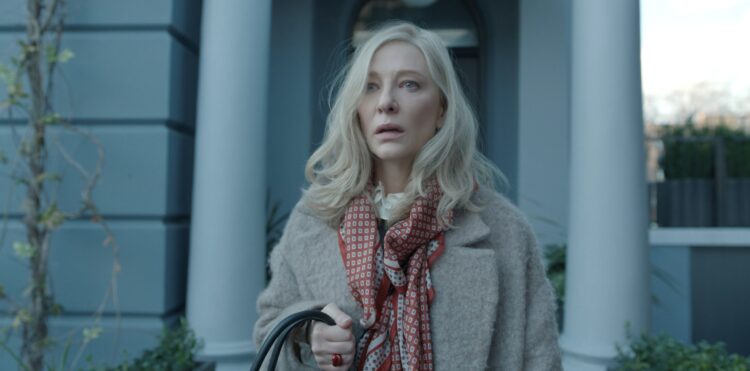

In Clint Eastwood’s Juror #2, Justin Kemp (Nicholas Hoult) finds himself in an unenviable position: not only was he selected for jury duty, but something odd occurs during the murder trial’s opening statements. Details surrounding the night of the murder begin to trigger memories for him. First, he realizes he was in the same bar as the defendant James Sythe and his girlfriend Kendall, that same evening one year ago, an odd coincidence, but not too bizarre. There are only so many bars in a small town. But then he recalls an accident he had on the way home that night, right where the murder occurred. He hit a deer, or so he thought, with his Toyota 4Runner. He eventually surmises it must have been he who unknowingly struck and killed Kendall walking alone in the dark. And now he’s on a jury who must decide the fate of a man accused of murdering her.
This intriguing setup is revealed in full in the film’s trailer, because Juror #2 is ultimately less about plot twists and reveals (although they are well deployed throughout the runtime) and more about the emotional turmoil Kemp experiences as he faces an impossible moral dilemma: does he turn himself in and free this innocent man? It doesn’t take much of a moral compass to acknowledge that this is what he should do. But as an audience pondering how we might react in the same scenario, we understand it’s not so easy. Kemp’s situation is further complicated by his pregnant wife Ally (Zoey Deutch), anxious from last year’s miscarriage and the high-risk status of the current pregnancy. They will need him. And a lawyer friend, Larry Lasker (Kiefer Sutherland) who is also Kemp’s A.A. sponsor, is clear that the law would not go easy on Kemp if he confesses to the accidental killing now. The pragmatic Lasker convinces Kemp to instead focus on making a difference from inside the jury room, using his unique position as the only one with knowledge of what actually happened to get this innocent man off. As you might expect, it does not go so easily, and Kemp quickly finds himself caught in a web of lies, trying desperately to stay ahead of individuals who are getting closer to the truth. Kemp avoids reflecting on this grim reality by throwing himself deeper into convincing his fellow jurors one by one, to flip their votes from “guilty” to “innocent.” His foolhardy attempt at absolution is a distraction from the inevitability of what the Book of Numbers promises: “Be sure your sin will find you out.”
Four years sober, Kemp has by most accounts turned his life around, and Hoult captures the anxiety of his troubled position through a physical performance that makes great use of his empathetic, anguished eyes. When his wife Ally eventually puts together what is going on, it’s almost a relief for audiences because it might allow Kemp to share his burden just a little.
Eastwood’s unflashy direction and attentiveness to his leads and peripheral players alike encase a throwback thriller. He displays a real knack for staging the jury deliberation scenes, which can shift from laidback and jokey to heated confrontation at the drop of a hat. The weighty subject matter never feels overwrought due to plenty of well-timed comic relief, penned by screenwriter Jonathan Abrams. Drew Scheid (Saturday Night) steals scenes as a stoner juror; he delivers a perfectly timed: “Sure, guilty’s cool” during the jury’s first mock vote. Leslie Bibb as the jury foreman with experience on two prior juries, finds Kemp’s erratic behavior exasperating, but keeps a smile plastered on her face while catering to his whims. J.K. Simmons shines in a slightly meatier role as know-it-all ex-detective Harold who is the first to take Kemp’s side, agreeing that something about this case feels off. Kemp and Harold’s unofficial partnership is short-lived after Harold latches onto the hit-and-run theory, which threatens exposing Kemp.
Faith Killebrew (co-lead Toni Collette) is a prosecutor running for District Attorney, and polling indicates a critical five-point swing should she win this case. Opposing defense attorney Erik Resnick (Chris Messina) is utterly convinced his client is innocent, and he appeals to Killebrew about prioritizing a justice untethered from political ramifications. Resistant to his pleas at first—too much is at stake with this election to entertain him—she eventually begins re-investigating the case on her own time, adding yet another obstacle for Kemp to deal with.
The jury is initially most interested in wrapping this trial up quickly, so they can get home to their families, and while Kemp is able to slowly convince many of them that Sythe is owed more consideration from them, there is a lingering presumption that while this may be true in theory, that doesn’t apply here because Sythe is a clear dirtbag. He’s a former gang member who fought with his girlfriend openly in the bar and is caught on cell phone video calling her a “bitch.” Most damning of all, he let her walk home in the dark of night in the pouring rain the night she died. Why should they waste their time on him? In an emotional defense of Sythe, evoking his own struggles with alcohol, Kemp questions if there’s any benefit of individual change if no one else will accept that it has occurred.
While the insight that justice is anything but blind is not a novel one, the casualness with which this selective application of justice is tossed around in Juror #2 can be enraging to witness. But Eastwood treats these jurors with compassion and as such he indicts us alongside them, for whenever we fail to extend grace to anyone—whether due to implicit or explicit biases or simply because they are a stranger.
An unexpected third-act time jump goes straight to the final verdict and illustrates just how hard it is to do the right thing when the moment finally comes. “It’s so goddamn hard to stay upright” as Nick Nolte’s Lt. Colonel Tall puts it in Terrence Malick’s The Thin Red Line. Directly following this verdict, Kemp and Collette’s District Attorney finally meet one another seated together on a bench. Neither can state outright what they wish to convey, and despite the limitations in communication there is an attempt to get the other to understand them. It’s heart-wrenching and one of the best scenes of the year. Likewise, Juror #2 stands out as the best late-career Eastwood film, from an era with its fair share of gems.
If Juror #2 is indeed Eastwood’s final work, then the film’s unexpected closing shot has him going out on a note of optimism, albeit of a distinctly bittersweet variety. This shot can be seen as a referendum on the ending of the lone Dirty Harry movie that Eastwood directed, 1983’s Sudden Impact. It’s an ending the legendary talent more than earns after 60 years of granting us some of the most morally complicated characters to light up the silver screen.
Juror #2 premiered at AFI Fest and opens on Friday.
The post Juror #2 Review: Courtroom Thriller Represents the Best from Clint Eastwood’s Late Era first appeared on The Film Stage.



